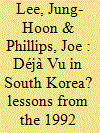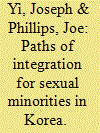| Srl | Item |
| 1 |
ID:
140221


|
|
|
|
|
| Summary/Abstract |
The Boycott, Divestment, and Sanctions (BDS) campaign against Israel is animated by a pragmatic strain that views external sanctions as effective pressure against a small democratic state and by a moralistic Manichean strain that portrays Israelis as oppressors. Both strains hearken back to the earlier campaign against apartheid in South Africa. We argue that doing so misreads the lessons of South Africa. Sanctions may have contributed to ending apartheid, but they operated in conjunction with improved security and interpersonal trust among negotiators. Key contenders moved from a discourse of oppression to one that humanized one another as partners with legitimate concerns. These conditions are missing from the Israeli–Palestinian conflict. Both sides consider their security to be precarious and they are locked in competing narratives of victimization, which further erode mutual trust and security. Measures to improve the parties’ security and trust would contribute to mutual concessions and greater justification for sanctions if the Israeli government is intransigent.
|
|
|
|
|
|
|
|
|
|
|
|
|
|
|
|
| 2 |
ID:
170916


|
|
|
| 3 |
ID:
147222


|
|
|
|
|
| Summary/Abstract |
North Korea has long been considered one of the worst abusers of human rights, which is saying a lot given the world's record of atrocities. Its notoriety mushroomed in February 2014 when the UN's Commission of Inquiry on Human Rights in the Democratic People's Republic of Korea (DPRK) produced its 371-page report, concluding that the country's atrocities do not “have any parallel in the contemporary world.”
|
|
|
|
|
|
|
|
|
|
|
|
|
|
|
|
| 4 |
ID:
174013


|
|
|
|
|
| Summary/Abstract |
South Korea–Japan relations are at their lowest point in decades, as colonial era disputes flare once again. Most pundits argue that the South Korean public is strongly united against Japan. We argue that South Korean elites are sharply divided over how to manage the crisis; this division is starting to impact how South Koreans understand colonial era narratives; and, long‐term, bilateral relations depend on how these growing divisions play out. Despite state censorship, a rising counter‐narrative in South Korea challenges the dominant, Manichaean, anti‐Japanese one. For the first time, Korea and Japan have a realistic chance of reconciling based on liberal public discourse and a nuanced, empirically based understanding of history.
|
|
|
|
|
|
|
|
|
|
|
|
|
|
|
|
| 5 |
ID:
136713


|
|
|
|
|
| Summary/Abstract |
Phillips, Joe
|
|
|
|
|
|
|
|
|
|
|
|
|
|
|
|
| 6 |
ID:
174098


|
|
|
|
|
| Summary/Abstract |
The United Nations’ Department of Peacekeeping Operations increasingly employs private military and security companies (PMSCs) to provide a range of services in peacekeeping operations (PKOs). The UN's reliance on PMSCs is often justified by quantity and quality gaps in traditional peacekeeping forces that must be filled by private companies’ expertise and efficiency. We argue that these long-standing gaps cannot adequately explain the use of PMSCs, which do not bring unique services and potentially undermine UN legitimacy. Instead, the UN's organizational rigidity, financial flexibility, and procurement opaqueness encourage PMSC use without accurately assessing their need, costs, and benefits. We suggest organizational reforms, without which PMSC involvement in peacekeeping operations is likely to continue and expand, and we propose further research to explain the PMSC phenomenon.
|
|
|
|
|
|
|
|
|
|
|
|
|
|
|
|